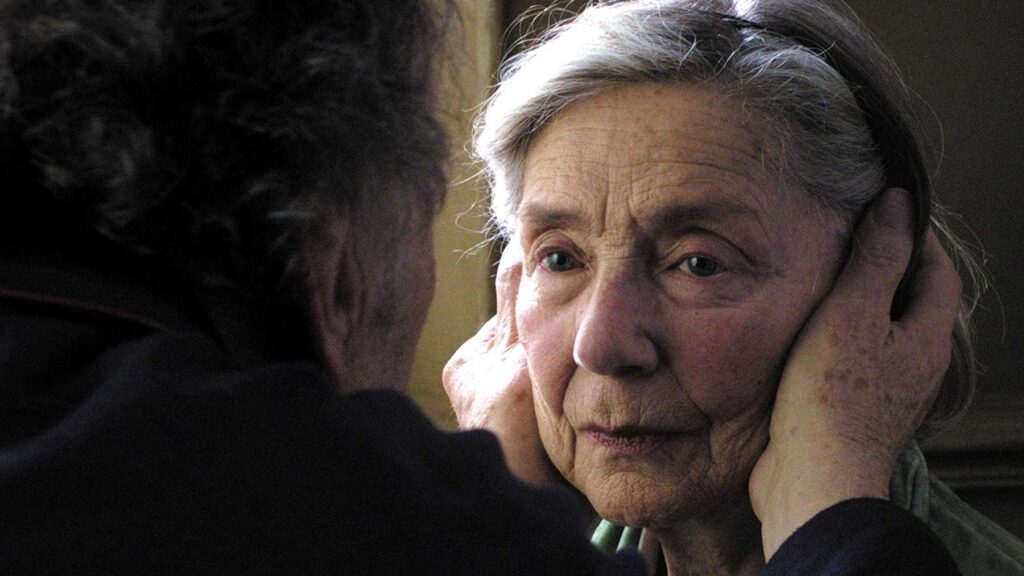Michael Haneke adds a touch of sensuous love to the lives in the evening through his deeply impactful film Amour. The film shows love knows no end, even in utterly adverse conditions. The most horrific experience in life is seeing the excruciating pain and suffering of somebody whom we love deeply. Prolonged illnesses of near and dear ones may generate irritations for a while, but soulful love stories do not end. Life only gets glorified through the glory of love. Haneke’s brutally honest film Amour is a testimony to that.
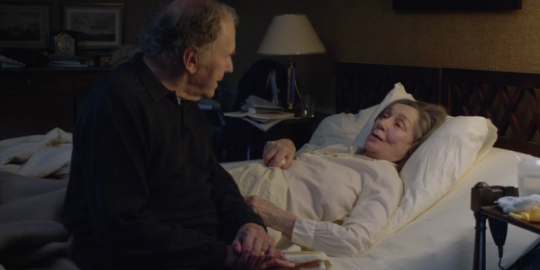
Even though Michael Haneke is an Austrian filmmaker, the story of Amour is set in Paris, France. The film starts with a bunch of fire and police officials break down the door of an apartment as the neighbors complained of a foul smell coming out of the apartment. A dead old lady is seen lying on a bed with flower petals all around her head. The identity of the lady is unknown. Then, the story flashes back a few months. Georges (Jean-Louis Trintignant) and Anne (Emmanuelle Riva) are an elderly octogenarian couple and retired piano teachers in a posh apartment in Paris.
They attend a musical concert by one of Anne’s favorite pupils Alexander in a theater. When they come back, they discover that somebody unsuccessfully tried to break into their house. Georges praises Anne’s beauty in front of a mirror. The next day Anne suffers a mild stroke on the breakfast table and she remains in a catatonic state for a while. She cannot remember the moment and is treated by a doctor. There is a blockage in her carotid artery, which needs to be operated on. The operation is not successful and her right side is paralyzed.
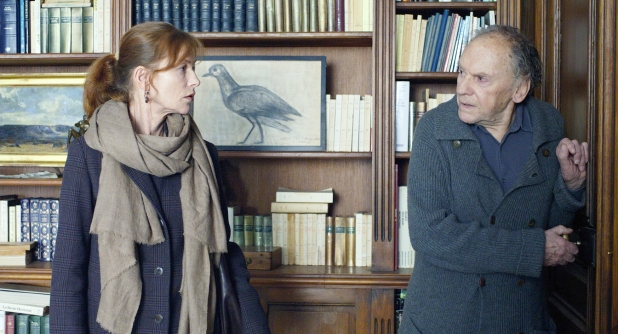
Now Anne is not able to walk and uses a wheelchair for her movement. Anne urges Georges not to send her to a hospital or nursing home again. Georges starts looking after her but sometimes gets irritated because of her present condition. Overall, Anne gets her loving husband all the time by her side. However, she starts getting depressed and demotivated because of her physical disability despite Georges’ support. One day, she even tries to commit suicide by jumping off the balcony. Anne does not want to be alive anymore.
Alexander pays a visit to the couple. Anne has a lively conversation with him, which assures Georges of her mental fitness. Soon she suffers a second stroke, which makes her more fragile and incapable of having a meaningful conversation. Anne’s deteriorating health condition puts a heavy strain on Georges. He employs a nurse three days a week to look after her. Her daughter Eva (Isabelle Huppert) lives abroad with her husband and occasionally pays a visit to her parents. She wants her mother to be in a nursing home against the promise of Georges to Anne. Georges employs a second nurse but lays her off immediately as she is mistreating Anne.
Georges tells the story of his childhood to Anne. He attended a holiday camp where he had to do a lot of physical activities like swimming in a river full of ice-cold streams of water. He sent a postcard to his mother with star signs on it indicating the difficulties in the camp. Unfortunately, he lost that postcard. His story relaxes Anne for the moment. After a little while, the film takes a dramatic turn when Georges smothers Anne pressing a pillow on her face.
Georges buys flowers from the market and cuts the flower petals and washes those with tap water. He also picks up one of Anne’s dresses and seals the door joints with tape. Then, he releases a pigeon and writes a letter mentioning it. He imagines that Anne is washing the utensils in the washbasin. When Anne asks, he puts on his coat and they come out of the apartment. The film ends with the starting scene wherein Eva is seen wandering and then sitting alone in the apartment.
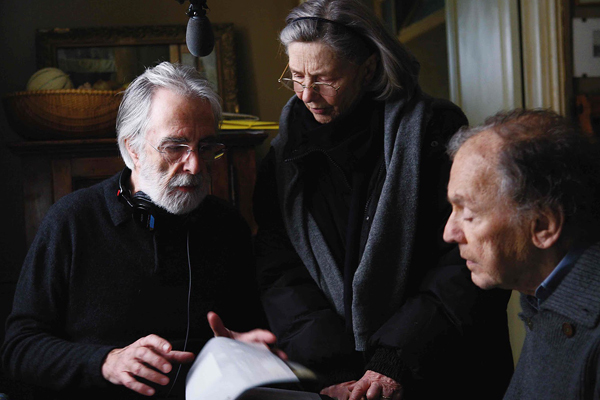
Haneke’s Amour shows us how difficult it is to witness the miserable sufferings of our loved ones. The film explores the physical and mental issues of old age. It takes a huge toll on a person to see their loved ones suffer. The strain and miseries do not end in a day but it just lingers. The pain is more than own agonies. Life just does not stop there. It is quite obvious that the other person sometimes gets irritated during the caring process but that does not prove the deficit of love in the relationship.
We never really reject our loved ones no matter how many times we stumble upon difficulties on the way. Love, care, and affection build the strongest relationship. Love does not bounce back, rather it inspires the relationships to be continued until the final end. The biggest identity of a cherished relationship is the love and care for each other. Haneke’s Amour is a study of shared and valued relationships at trying times. Life goes on.
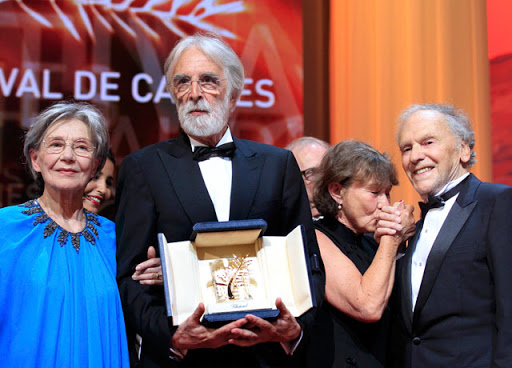
Michael Haneke expresses emotions but avoids sentimentality in Amour. The film is based on one of his life experiences. He took care of his aunt in a paralyzed condition. Haneke’s direction is humane but to the point. He avoids the elements of melodrama throughout the film. The subject matter of the film is not limited to a specific country but universal. The film is written by Haneke himself. The dialogues in the film reflect the mood of the characters and comply with the theme of the film. The film was mostly shot in long takes, which is one of his signature styles. Barring a few Hand-held camera-captures, the film has mostly static shots with a stationary mounted camera.
The film is so neatly woven and planned that there are not many tasks for the editors. It is unbelievable to see Jean-Louis Trintignant and Emmanuelle Riva deliver overwhelming performances. Georges and Anne appear original on-screen. Amour won the Palme d’Or at the 2012 Cannes Film Festival. It was nominated for five Academy Awards for Best Picture, Best Director, Best Original Screenplay, Best Actress in a Leading Role, and Best Foreign Language Film at the 85th Academy Awards winning the Oscar for Best Foreign Language Film. It also won the Golden Globe award for Best Foreign Language Film at the 70th Golden Globe Awards.

